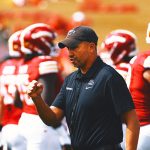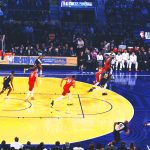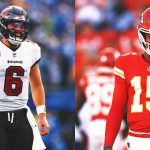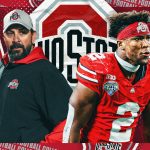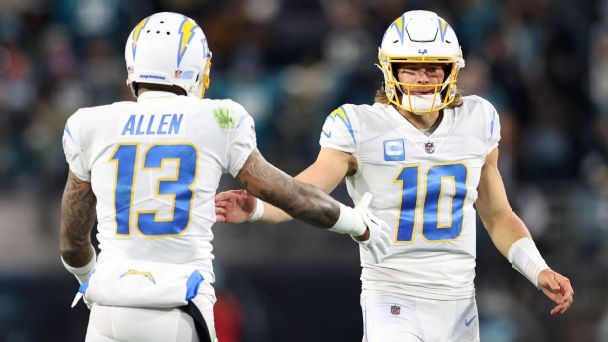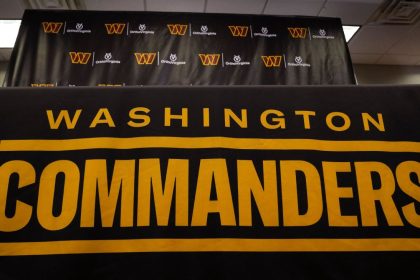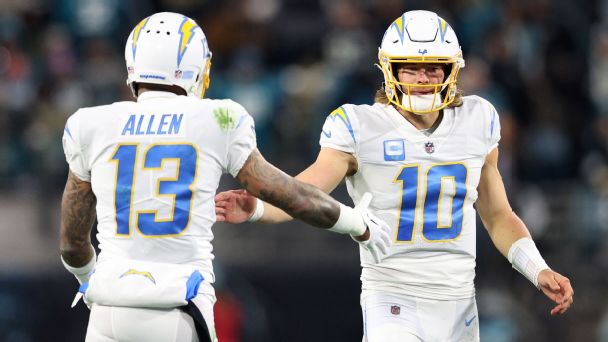
COSTA MESA, Calif. — The Los Angeles Chargers made a significant change after the season when they fired offensive coordinator Joe Lombardi and replaced him with former Dallas Cowboys offensive coordinator Kellen Moore.
More offensive changes are expected after falling short of a deep postseason run and because of salary cap constraints.
Moore inherits a unit that ranked 14th in offensive efficiency last season, averaging 22.5 points per game (10th), leaving plenty of room for improvement powered by quarterback Justin Herbert.
“We’re going to probably have a new vision and approach on offense,” general manager Tom Telesco said after the season. “We’ll always be a passing team. We have Justin Herbert, we like to throw the ball. We’re never going to be a 50-50 balanced team of run and pass, but you have to be able to run the football efficiently and effectively, especially in the second half of games where you have leads.”
Coming off a 10-7 season and a quick exit from the playoffs after losing 31-30 to the Jacksonville Jaguars, which included surrendering a 27-point lead in large part because of the inability to run the football, Herbert expressed an eagerness to return and improve on the performance.
“That’s good fuel for the offseason,” Herbert said on locker clean-out day in January. “Unfortunately it didn’t go our way this year, but we’re going to continue to work hard and this offseason will be big.”
The Chargers are currently projected to be $20.5 million over the 2023 salary cap, according to Over The Cap. Some adjustments to offensive personnel will be necessary to be in compliance with the cap at the start of the new league year on March 15.
Here’s the state of each offensive position group – great, satisfactory or needing adjustment – as they look ahead to free agency and the draft.
Quarterback — Great
In his third season, Herbert demonstrated again why he is considered among the top young quarterbacks, all while playing through an amount of adversity he had yet to experience in his pro career.
On his way to passing Andrew Luck for the most passing yards through a quarterback’s first three NFL seasons, the 24-year-old played several weeks through fractured rib cartilage, adjusted without play-making receivers Keenan Allen and Mike Williams — who were available together for only four complete games because of injuries, and then underwent postseason surgery to repair the labrum in his left shoulder.
“I sleep better at night knowing we have a franchise quarterback,” Telesco said. “He’s done so much already in his young career, yet we all know there’s still a lot there because of his commitment to the game.”
The Bolts are in the market for a backup with Chase Daniel and Easton Stick both scheduled to become unrestricted free agents, but finding a backup for Herbert should not be of great concern given his proven ability to play through injury and pain.
Wide receiver — Satisfactory
The expectation for this group, given the track record of Allen and Williams, was greatness. But significant injuries caused it to fall short.
Allen missed seven games because of a left hamstring strain and Williams sat out five games because of a right high ankle sprain before he fractured his back in Week 18 and missed the wild-card playoff.
Rumors have swirled that Allen, who has played 10 seasons for the Chargers, could become a salary-cap casualty, but don’t expect that to materialize.
“It’s not tempting to me,” Telesco said when asked if cutting Allen was a temptation given it would save $14.8 million in cap space. “Good players make money and I would rather have a lot of good players on our roster than a lot of cap space.”
Joshua Palmer showed improvement in his second season, catching 72 passes for 769 yards and three touchdowns.
But for this group to potentially reach the next level, and to fully utilize the strengths of Herbert, the Bolts should attempt to add a speedy receiver who can stretch the field and alleviate some of the pressure on Williams to consistently make impact plays.
“Speed is always dangerous,” Moore said in an introductory news conference. “We certainly have seen that throughout this league. When you do have speed, it is certainly a huge advantage.”
Telesco said speed would be of use, but that it would not come at the cost of Allen or Williams.
“Would I love a bit, 4.3 receiver? Yeah,” Telesco said when asked several questions on the topic. “Are you kidding me? Absolutely. But, I like the guys that we have, too. I’m not giving those guys back.”
DeAndre Carter, who consistently stepped up in the absence of Allen and Williams and stabilized the return game on special teams, is set to become an unrestricted free agent.
Offensive line — Needs adjustments
The personnel appears to be mostly in place to have a top-caliber line, with the challenge being to ensure the health of players. The line was forced to adjust throughout the season because of injuries.
Left tackle Rashawn Slater was placed on injured reserve after Week 3 because of a torn left biceps tendon and was replaced by rookie sixth-round pick Jamaree Salyer. Veteran center Corey Linsley missed three games because of various injuries and right tackle Trey Pipkins III missed three games as he battled through a knee issue.
The unit finished with a pass-block win rate of 56.6% (Ranked 23rd) and a run-block win rate of 70% (28th).
“There is a different level that we need to play at, offensively, particularly at the line of scrimmage and in the run game,” coach Brandon Staley said. “And having the marriage of the run and the pass, creating more explosions on early down.”
Those numbers should significantly improve with the return of Slater, who was on track to return if the Bolts advanced to the divisional playoff.
But an answer must be found at right tackle, where Pipkins is scheduled for free agency.
After gaining significant pro experience at left tackle, the position where he earned a national championship at Georgia, it’s possible that Salyer could be a candidate to flip to right tackle, despite being drafted to play guard.
“We’ll figure out what the best role for Jamaree is,” Telesco said. “It’s a negative when a player gets hurt. The one little positive is other players getting an opportunity and now, we know what he can do, rather than thinking he can do something. It will give us some flexibility.”
With the need to comply with the salary cap, it could be interesting to see what happens with veteran left guard Matt Feiler, who has one year remaining on his contract and if cut, could create $6.5 million in cap savings.
Center Will Clapp, who started in Linsley’s absence, is scheduled for free agency.
Running back — Needs adjustments
Adjustments, improvement. It’s one and the same with this group, which Moore will be tasked with fixing.
“From my vantage point, what Austin has done has been remarkable,” said Moore of Austin Ekeler, the NFL’s touchdown leader (18) in 2022. “You saw Josh [Kelley] start to develop a role. Certainly, that’ll be a situation that, hopefully, we develop two or three guys in there that can all take turns.”
Joshua Kelley established himself as the No. 2 back behind Ekeler, while rookie Isaiah Spiller experienced what could be described as a rookie learning curve at the position, playing in only six games and rushing for 41 yards.
“If you look at where our rushing numbers will be — like I said, they’re never going to be high rushing numbers, as far as terms of yards — but yards per carry should be better,” Telesco said.
The Bolts averaged only 3.8 yards per carry last season (30th). The last time they appeared in the NFL’s top 10 in yards per carry was 2018, when they averaged 4.7 yards per rush (7th), powered by former Charger Melvin Gordon.
Tight end — Needs adjustment
Chemistry grew throughout the season with Gerald Everett, who joined the team on a two-year $12 million contract and is expected to return.
In his sixth NFL season, Everett finished with a career-high 87 catches for 555 receiving yards and four touchdowns.
Donald Parham Jr., who returned this season after suffering a significant head injury in 2021, was sidelined and slowed because of hamstring issues and could be in danger of losing his roster spot. The Bolts also could move on from Tre’ McKitty, a third-round pick in 2021, after a challenging second season in which he caught only 55.6% of the passes he was targeted on and struggled with blocking assignments.

